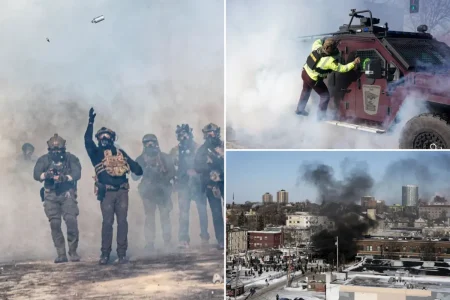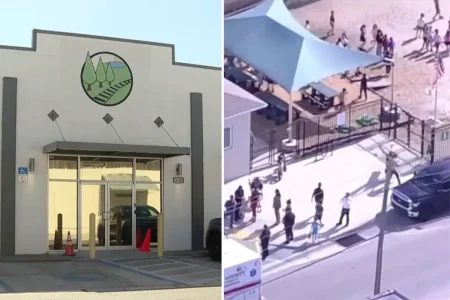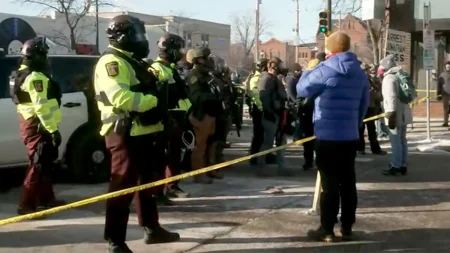Humanitarian Flotilla Intercepted: Greta Thunberg Among Activists Challenging Gaza Blockade
In a dramatic confrontation on the Mediterranean Sea, Israeli naval forces intercepted a humanitarian flotilla attempting to breach the longstanding blockade of Gaza. Among those aboard was prominent climate activist Greta Thunberg, whose presence brought international attention to the maritime protest organized amid the ongoing conflict in the region. The flotilla, comprising several vessels carrying activists, humanitarian supplies, and symbolic messages of solidarity, represented the latest in a series of attempts by international civil society to challenge the maritime restrictions Israel has maintained around Gaza’s coastline.
The interception occurred in international waters approximately 85 nautical miles from Gaza’s shore, according to organizers of the “Freedom Flotilla Coalition.” Naval vessels surrounded the humanitarian boats in the predawn hours, cutting off their approach to Gaza’s territorial waters. Witnesses reported that Israeli forces boarded the vessels after issuing multiple warnings via radio. The coalition, which had publicly announced its intentions weeks before setting sail from various Mediterranean ports, stated that their mission was to deliver medical supplies, food, and other humanitarian necessities to Palestinian civilians caught in what they described as a dire humanitarian crisis resulting from the ongoing conflict.
International Response and Diplomatic Tensions
The maritime incident quickly escalated into a diplomatic flashpoint, with nations divided in their responses along familiar geopolitical lines. Several European governments issued statements expressing concern about the treatment of their citizens aboard the vessels, while simultaneously acknowledging Israel’s security concerns regarding maritime access to Gaza. The United Nations Secretary-General called for restraint and emphasized the importance of humanitarian access to Gaza, though stopped short of condemning Israel’s enforcement of the blockade. Meanwhile, human rights organizations documented the incident, with some characterizing it as a disproportionate response to a civilian humanitarian mission, while others noted the complex security dimensions of the situation.
This latest attempt to break the naval blockade comes at a particularly sensitive moment in the conflict, with ceasefire negotiations stalled and humanitarian conditions in Gaza deteriorating according to multiple international monitoring agencies. The presence of Thunberg, who has increasingly expanded her activism beyond climate issues to embrace broader human rights causes, significantly amplified global media coverage of the flotilla. Social media platforms were flooded with images and videos from the early stages of the journey, though communications from the vessels ceased following the interception. Diplomatic representatives from several nations whose citizens were aboard the flotilla immediately requested consular access to those detained, adding another layer of complexity to an already tense international situation.
Historical Context of Maritime Protests and the Gaza Blockade
The attempted breach of Gaza’s naval blockade follows a pattern of similar maritime protests dating back more than a decade. The most notable previous incident occurred in 2010, when Israeli commandos boarded the MV Mavi Marmara, resulting in the deaths of ten activists and sparking an international crisis. Since then, several smaller attempts have been made to challenge the blockade, though none have successfully reached Gaza’s shores. Israel has maintained that the naval blockade, implemented after Hamas took control of Gaza in 2007, is necessary to prevent weapons smuggling and materials that could be used for military purposes against Israeli territory.
Critics of the blockade argue that it constitutes collective punishment of Gaza’s civilian population and has contributed significantly to the humanitarian crisis in the territory. International legal opinions have been divided on the legitimacy of the blockade, with some experts maintaining that it is permissible under international law as a security measure during an armed conflict, while others contend that its implementation and effects violate principles of proportionality and distinction between combatants and civilians. The flotilla organizers specifically framed their mission within international humanitarian law, arguing that the severity of civilian suffering in Gaza creates a legal and moral imperative to deliver aid by any means possible, including challenging the blockade directly.
Thunberg’s Evolving Activism and the Globalization of Causes
Greta Thunberg’s participation in the Gaza flotilla represents a significant evolution in her public activism, which began with solitary climate protests outside the Swedish parliament and has grown to encompass a broader spectrum of social justice causes. Her involvement brought unprecedented attention to the maritime protest, with supporters praising her consistency in standing with vulnerable populations and critics questioning whether her presence unnecessarily politicized a humanitarian mission. In recent statements before boarding the flotilla, Thunberg emphasized what she described as the interconnected nature of climate justice and human rights, arguing that the same systems of power that enable environmental degradation also perpetuate human suffering in conflict zones.
The flotilla incident underscores the increasingly global nature of activism in the digital age, where causes that might once have remained regional concerns now attract international solidarity movements and high-profile advocates. Media coverage of the flotilla spanned continents, with particularly intense discussion in Scandinavian countries where several of the activists, including Thunberg, originate. The detention of the activists has already sparked protests in multiple European capitals, with demonstrators demanding their immediate release and an end to the Gaza blockade. As diplomatic negotiations continue regarding the status of those detained, the incident has renewed global debate about humanitarian access to Gaza, the legality of the blockade, and the effectiveness of direct action protests in conflict zones.
Humanitarian Conditions and the Path Forward
Beyond the immediate circumstances of the flotilla interception, the incident has refocused international attention on the humanitarian situation in Gaza, which multiple UN agencies have described as catastrophic. According to recent assessments, critical shortages of medical supplies, clean water, and basic necessities continue to affect the civilian population, with particular concern for vulnerable groups including children, the elderly, and those with chronic medical conditions. While Israel maintains that substantial humanitarian aid enters Gaza through land crossings subject to security screenings, international organizations consistently report that the volume remains insufficient to meet the population’s basic needs during the ongoing conflict.
The flotilla organizers have vowed that this interception will not be the end of their campaign, announcing plans for future maritime missions to challenge the blockade. Meanwhile, diplomatic efforts continue on multiple fronts to increase humanitarian access to Gaza through established channels while addressing Israel’s security concerns. As the detained activists, including Thunberg, await resolution of their legal status, the international community faces familiar but urgent questions about balancing security imperatives with humanitarian principles in one of the world’s most protracted conflicts. The image of small civilian vessels confronting a naval blockade has once again become a powerful symbol in the complex narrative of the Israeli-Palestinian conflict, where humanitarian concerns, security imperatives, international law, and competing national aspirations continue to clash on land and at sea.








